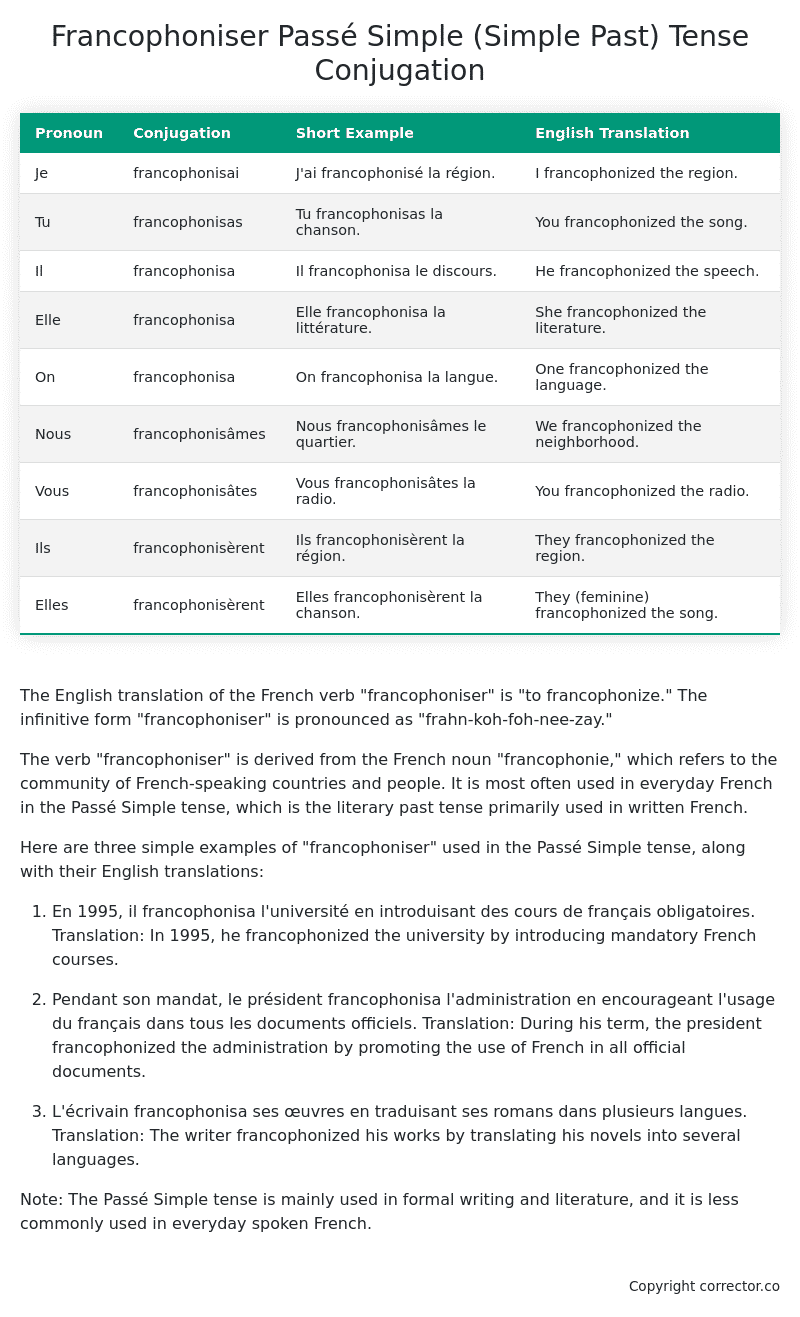Passé Simple (Simple Past) Tense Conjugation of the French Verb francophoniser
Introduction to the verb francophoniser
The English translation of the French verb “francophoniser” is “to francophonize.” The infinitive form “francophoniser” is pronounced as “frahn-koh-foh-nee-zay.”
The verb “francophoniser” is derived from the French noun “francophonie,” which refers to the community of French-speaking countries and people. It is most often used in everyday French in the Passé Simple tense, which is the literary past tense primarily used in written French.
Here are three simple examples of “francophoniser” used in the Passé Simple tense, along with their English translations:
-
En 1995, il francophonisa l’université en introduisant des cours de français obligatoires.
Translation: In 1995, he francophonized the university by introducing mandatory French courses. -
Pendant son mandat, le président francophonisa l’administration en encourageant l’usage du français dans tous les documents officiels.
Translation: During his term, the president francophonized the administration by promoting the use of French in all official documents. -
L’écrivain francophonisa ses œuvres en traduisant ses romans dans plusieurs langues.
Translation: The writer francophonized his works by translating his novels into several languages.
Note: The Passé Simple tense is mainly used in formal writing and literature, and it is less commonly used in everyday spoken French.
Table of the Passé Simple (Simple Past) Tense Conjugation of francophoniser
| Pronoun | Conjugation | Short Example | English Translation |
|---|---|---|---|
| Je | francophonisai | J’ai francophonisé la région. | I francophonized the region. |
| Tu | francophonisas | Tu francophonisas la chanson. | You francophonized the song. |
| Il | francophonisa | Il francophonisa le discours. | He francophonized the speech. |
| Elle | francophonisa | Elle francophonisa la littérature. | She francophonized the literature. |
| On | francophonisa | On francophonisa la langue. | One francophonized the language. |
| Nous | francophonisâmes | Nous francophonisâmes le quartier. | We francophonized the neighborhood. |
| Vous | francophonisâtes | Vous francophonisâtes la radio. | You francophonized the radio. |
| Ils | francophonisèrent | Ils francophonisèrent la région. | They francophonized the region. |
| Elles | francophonisèrent | Elles francophonisèrent la chanson. | They (feminine) francophonized the song. |
Other Conjugations for Francophoniser.
Le Present (Present Tense) Conjugation of the French Verb francophoniser
Imparfait (Imperfect) Tense Conjugation of the French Verb francophoniser
Passé Simple (Simple Past) Tense Conjugation of the French Verb francophoniser (You’re reading it right now!)
Passé Composé (Present Perfect) Tense Conjugation of the French Verb francophoniser
Futur Simple (Simple Future) Tense Conjugation of the French Verb francophoniser
Futur Proche (Near Future) Tense Conjugation of the French Verb francophoniser
Plus-que-parfait (Pluperfect) Tense Conjugation of the French Verb francophoniser
Passé Antérieur (Past Anterior) Tense Conjugation of the French Verb francophoniser
Futur Antérieur (Future Anterior) Tense Conjugation of the French Verb francophoniser
Subjonctif Présent (Subjunctive Present) Tense Conjugation of the French Verb francophoniser
Subjonctif Passé (Subjunctive Past) Tense Conjugation of the French Verb francophoniser
Subjonctif Imparfait (Subjunctive Imperfect) Tense Conjugation of the French Verb francophoniser
Conditionnel Présent (Conditional Present) Tense Conjugation of the French Verb francophoniser
Conditionnel Passé (Conditional Past) Tense Conjugation of the French Verb francophoniser
Conditionnel Passé II (Conditional Past II) Tense Conjugation of the French Verb francophoniser
L’impératif Présent (Imperative Present) Tense Conjugation of the French Verb francophoniser
L’impératif Passé (Imperative Past) Tense Conjugation of the French Verb francophoniser
L’infinitif Présent (Infinitive Present) Tense Conjugation of the French Verb francophoniser
L’infinitif Passé (Infinitive Past) Tense Conjugation of the French Verb francophoniser
Le Participe Présent (Present Participle) Tense Conjugation of the French Verb francophoniser
Le Participe Passé (Past Participle) Tense Conjugation of the French Verb francophoniser
Struggling with French verbs or the language in general? Why not use our free French Grammar Checker – no registration required!
Get a FREE Download Study Sheet of this Conjugation 🔥
Simply right click the image below, click “save image” and get your free reference for the francophoniser Passé Simple tense conjugation!

Francophoniser – About the French Passé Simple (Simple Past) Tense
Formation
Usage
Narration
Historical Context
Interactions with other tenses
Passé Composé
Imparfait
Conditional and Subjunctive
Summary
I hope you enjoyed this article on the verb francophoniser. Still in a learning mood? Check out another TOTALLY random French verb conjugation!


